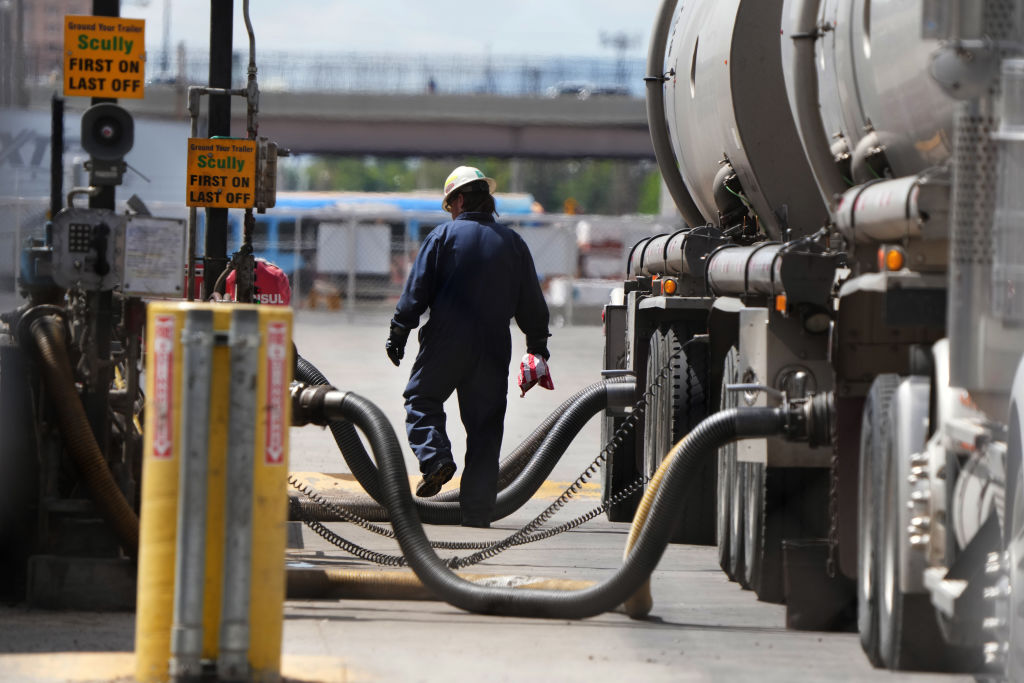As fuel prices continue to rise across the country, President Biden has a solution: Demand refineries increase output, or else. America’s chief executive issued an ultimatum to Marathon Petroleum Corp, Valero Energy Corp, ExxonMobil, Phillips 66, Chevron, BP, and Shell, vaguely threatening the use of “emergency powers” in the near term should the companies not take the “opportunity” to immediately increase supply. What he either can’t understand or won’t admit is that he’s a part of the very problem he now struggles to solve.
Who’s to Blame?
Those greedy gas station owners are robbing consumers again. No, it’s Putin’s price hike. No, no, wait … it must be the refineries – those dastardly oil refiners are throttling production to inflate prices and their own profit margins. If you listen to the current administration and Democrats, in general, try to explain away the current pain at the pump, they’ll lay the blame at just about everyone’s feet but their own.
Yes, oil refineries are enjoying a higher profit margin than usual right now – but it isn’t because they’re holding back supply. According to Jason Gabelman, a director of sustainability and energy transition at the investment bank Cowen, refineries are pumping out as much diesel and gas as possible. “You know, they’re trying to produce as much as they can, because refining margins are where they are,” he explained recently to Marketplace. “So they have every economic incentive to run all in.”
So what’s the holdup? We’ve lost refining capability. The pandemic – or, more specifically, the lockdowns – dropped the demand for diesel and gas dramatically. As refineries shut down due to COVID restrictions and lack of demand, the refining capacity in the US fell by 4.5% during 2021, according to Reuters. Five refineries across the nation closed permanently, and there were operation cuts across the industry.
Now demand – and profits – are up. But there’s another roadblock. The Biden administration created numerous barriers to the industry by pushing “green” energy policies. Recall that under the Trump administration, the US was a net exporter of energy – not an importer. America became fully energy independent for the first time in about 75 years toward the end of 2019. Even then, many of the top Democratic Party presidential candidates at the time spoke of banning fracking.
While Biden scrambles to pass the blame, his climate czar, John Kerry, makes it clear that the US does not need to drill for more oil. Democrats have been pushing the death of fossil fuels for years, and the negative press has taken its toll on the industry. Between the current administration’s green agenda and the popularity of the climate change narrative amongst progressive activists and media, the future of the oil industry is far from certain – and investors aren’t keen on the risk. Indeed, five of the companies on the receiving end of Biden’s threats saw their share value take a hit by the close of day – and all seven have dropped in value over the past five days.

(Photo by George Frey/Getty Images)
Refineries are expensive; without an influx of funds – something nigh impossible to find with no real expectation the new facilities would survive the current administration – opening more plants simply isn’t an option.
Government Solutions, Real Emergencies
But what does it mean when this president threatens the use of emergency powers? It’s hard to say. Biden himself might not know or even have much of an idea. There are many moves available should he declare an emergency and propose some sort of solution, but the first things that come to mind are options others have taken before in other situations. Perhaps Biden will invoke the Defense Production Act (DPA), forcing refineries to crank up output – perhaps even making them open new plants or reopen closed facilities – with no regard to what it costs these companies to do so. Is it physically possible for refiners to comply with such an order? Probably. Will spending more money to operate than they bring in destroy at least some of the few refiners we have left? Also probably.
Instead of – or, if we’re particularly unlucky, in addition to – the DPA, the administration might seek to impose price controls, artificially setting and locking in the price of gas and diesel at the pumps. While that would hamstring the industry at just about every level, from drillers to refineries to gas stations, it may at least give a slight respite to the consumer – until the gas is all gone, of course, or until the companies necessary for the production and distribution of fuel die of political and financial asphyxiation. It does no one any good for gas to go back to $2.50 a gallon because Biden said so if there’s no more gas or nowhere to buy it.
In a statement responding to Biden’s letter, ExxonMobil had a few more productive ideas:
“In the short term, the U.S. government could enact measures often used in emergencies following hurricanes or other supply disruptions — such as waivers of Jones Act provisions and some fuel specifications to increase supplies. Longer term, government can promote investment through clear and consistent policy that supports U.S. resource development, such as regular and predictable lease sales, as well as streamlined regulatory approval and support for infrastructure such as pipelines.”
The problem with government “solutions” to problems in the market is that, more often than not, the cure is worse than the cause. And that’s assuming the current crisis wasn’t – as it was in this case – at least partially created by another so-called solution to some other problem, real or imagined, from the government. A lack of refineries and oil to refine isn’t something that can be undone immediately, but at least a full reversal of the Biden administration’s energy policies thus far – which is essentially what ExxonMobil suggests – would be a decent start. And who knows? If Democrats and the green left in general promise not to turn around and make the same mistakes all over again as soon as the nation is in the clear, investors might just lend a helping hand to make “Saudi America” great again.







